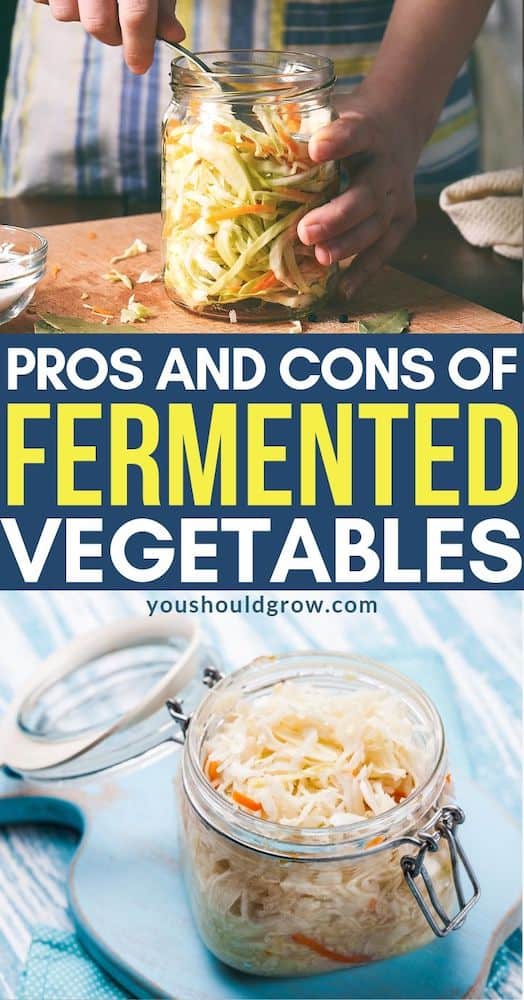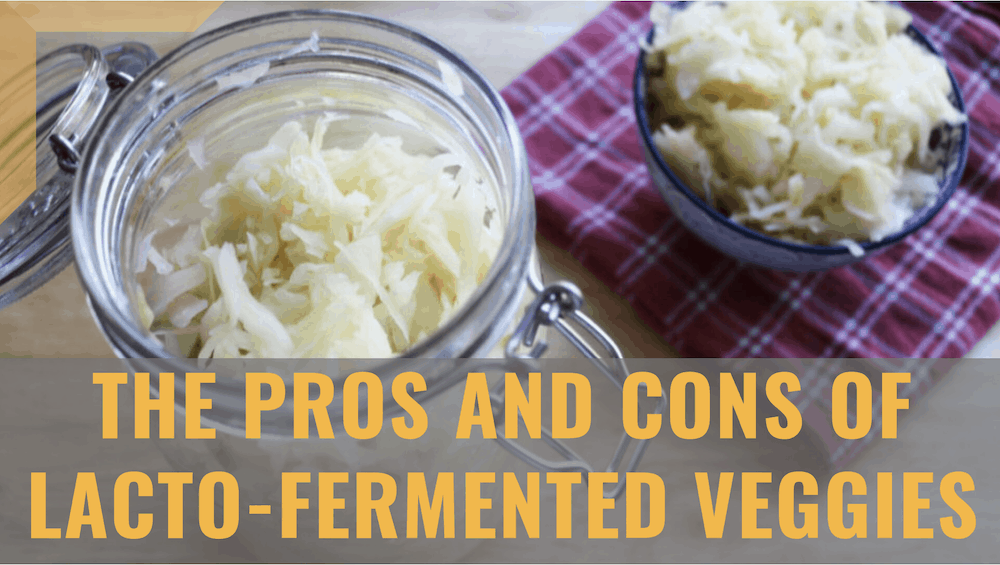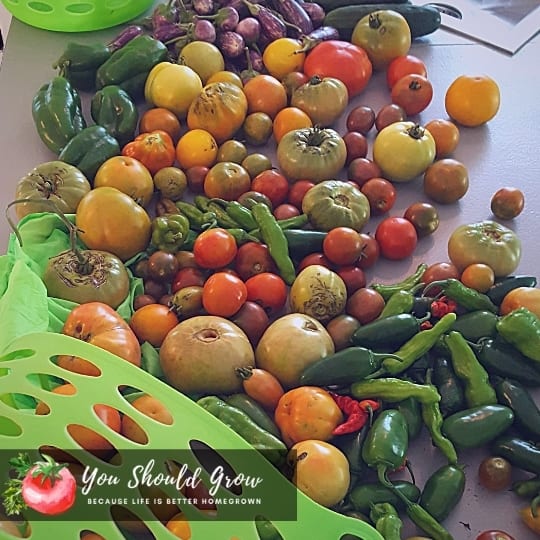Lacto Fermented Vegetables: Should You Eat Them?
As an Amazon Associate and member of other affiliate programs, I earn from qualifying purchases.
If you’ve ever been curious about the Pros and Cons of lacto-fermented vegetables, this is the post for you. We’re about to cover everything you need to know before you decide to add fermented veggies to your diet.
This post is written by Kyle Erickson of Food Fitness Family
Fermented veggies have been around since time immemorial. It was a great way to preserve your harvest during the pre-fridge dark ages. (I actually wish I lived a lot more like the Amish, TBH – technology seems like more of a bane than boon anymore!)
And there’s more reason behind the tradition of fermenting food than just preserving it. They ate it because there are significant health benefits too!
But since things are so messed up with our food system and environmental toxins are everywhere, it’s more important than ever to get these tasty soured goodies into your diet on the regular. That said, because things are so messed up, some people may need to approach eating lacto-fermented vegetables with caution.
I’ll start with the main CONS. Then the PROS. And then a couple of bonus tidbits of useful info to wrap up. Ready?
The Cons of Lacto-Fermented Vegetables
#1 – They’re High In Histamines – Histamine Intolerance
As I mentioned in the opening, because of a jacked-up food system and environmental toxins, there are loads of conditions and intolerances that have cropped up over the recent years. One of them is histamine intolerance. Essentially people have been dealing with this for a while in the form of seasonal allergies.
What makes histamine intolerance different is getting seasonal allergy symptoms when it’s not allergy season. In other words, your body cannot metabolize histamine from food very well. That or you have bad gut bacteria that are producing histamine in excess. Either way, it’s not getting cleared.
Lacto-fermented veggies are high in histamine BUT there’s a potential solution. You can use these soil based probiotics as a starter culture for your ferment that don’t produce histamine during fermentation. In fact, anecdotal evidence suggests that these same bacteria may even metabolize histamines reducing your symptoms from histamine intolerance! For more info, Kiran Krishnan, a microbiologist specializing gut health, gives additional detail in this interview at 59:27.

#2 – Potential To Have A Batch Go Bad
Another downside to lacto-fermented veggies is that if you’re making your own, batches CAN go bad. I will say that in all the years I’ve been doing it myself, I’ve never had this happen. But I’ve read about lots of folks who have. Eating bad ferments can make you pretty sick so always ensure you’re careful about cleanliness before starting.
I use raw organic apple cider vinegar to clean everything before I put my veggies into my crock. I use an open air crock which is considered a little “riskier” than using water sealed anaerobic crocks. It’s totally up to you what you use. Just make sure you clean all your preparation tools, surfaces, crock weights and crocks/jars really well.
Last note here, use your nose. A good batch will have that nice sour aroma that almost has a sweetness to it. If your nose is telling you that something is even a little bit off, don’t risk it. Have someone else smell it and when it doubt, throw it out.
#3 – Making Your Own Takes Planning & Time
I’ll admit, I’m not the biggest fan of making sauerkraut at home. It takes me about an hour and a half to make a batch. Granted, I make huge batches because we barter some of our sauerkraut for 3 dozen pastured eggs a week from our friend’s farm. But it’s still a pain.
Then after chopping and mashing forever, it still takes 3 weeks to ferment. That seems to be the sweet spot for our sour-ness preference. All that said, we usually run out before the next batch is done if I don’t plan accordingly.
It takes diligence that I don’t always have the bandwidth for. (Working full time, being married, having twin 6 year old boys and a newborn and trying to build a business.)
It’s definitely worth the financial savings. And it’s WAY better than anything I can buy in the store in terms of taste!
That’s it for the cons! There aren’t many, that’s for sure. Now lets take a look at the pros…
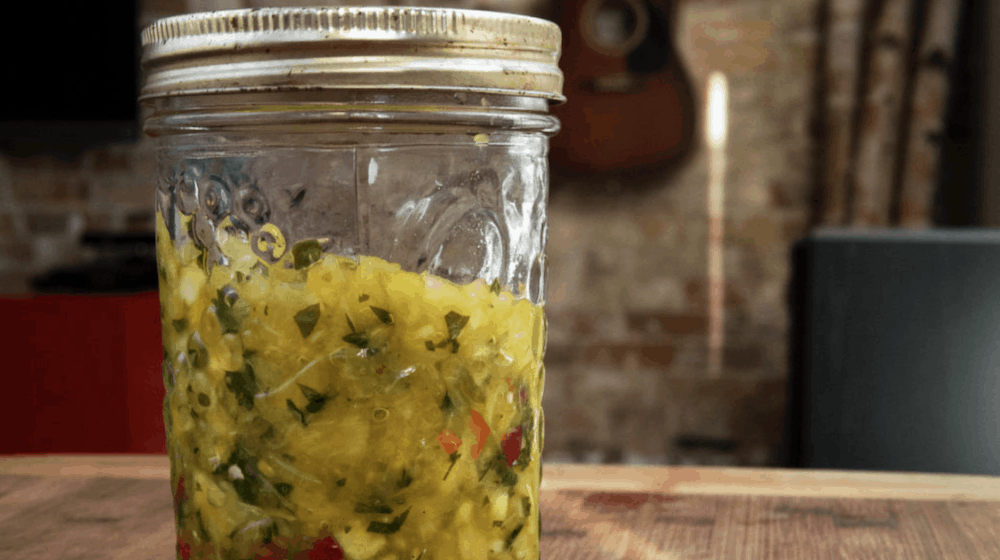
The Top 3 Pros Of Lacto-Fermented Vegetables
#1 – Detoxification
This benefit comes twofold.
First, the process of fermentation detoxifies plant foods of anti-nutrients and toxins. Plant foods contain stuff like phytic acid, lectins, and oxalates that are mostly, if not completely, mitigated by fermentation.
Second, the bacteria in fermented veggies helps our bodies detox as well. Probably THE most important thing is that a strain of bacteria commonly found in fermented foods metabolizes Glyphosate. Yeah, the stuff in Roundup.
I would argue that Glyphosate is the “smoking” of our generation but that conversation is for another time! But suffice to say, fermented food is one of the few things on the short list of stuff that can fully detox Glyphosate out of your body. ‘Nuff said.
#2 – Nutritional Enhancement & Bioavailability
Lacto-fermented veggies get a nutritional boost compared to their raw counterparts. Cabbage contains 30mg of vitamin C per cup – not bad. Well, I guess it is bad compared to the 700mg of vitamin C found in fermented red cabbage!
Fermentation even ADDS nutrients that aren’t found in their raw forms. Sticking with the sauerkraut example, fermentation creates vitamin K2 which is non-existent in raw cabbage. Pretty cool stuff!
Bioavailability is a fancy word for “what nutrients your body actually absorbs.” Lacto-fermented veggies are much easier to digest and the nutrients in them are much easier for your body to use. They also make any other food you eat with them easier to digest and absorb!
I’m sure you’ve heard the saying, “You are what you eat.” Well, you’re not so much what you eat as you are what you can actually absorb. Another win for fermented food!
#3 – Improves Gut Health
By now I think most people have caught on to the fact that our gut health plays a critical role in our overall health. Lacto-fermented veggies improve gut health in a variety of ways. Here are a couple to consider:
- Contributes Probiotics – these are beneficial bacteria and yeast that grow when fermenting your veggies. They can help manage IBS symptoms, upregulate your immune system, improve your mood, reduce inflammation and discourage the overgrowth of “bad” bacteria in your gut. They also create a more acidic environment in your gut which is the environment that the “good” bacteria thrive in.
- Includes Prebiotics – aka soluble fiber is the “food” for the beneficial bacteria and yeasts in our gut. The wider the variety of plant foods you experiment with in your ferments the better. This is because the diversity of plant foods in our diet increases the diversity of healthy gut microbes. This creates a more resilient immune system and more robust health overall.
So there you have it – the PROS and CONS of lacto-fermented veggies. In my not-so-humble-opinion, the pros FAR outweigh the cons.
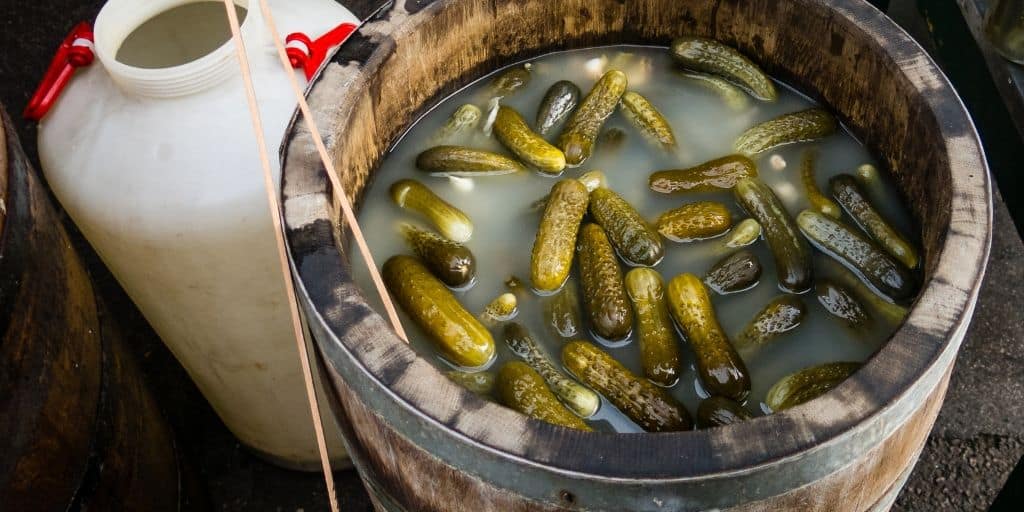
If you want to learn more about the benefits of fermented foods and would like a step-by-step tutorial on how to make an absolutely delicious Eastern European Sauerkraut, check out my comprehensive article here.
More Useful Info About Fermented Vegetables
Some under the radar fermented veggies to try: condiments!
Healthy store-bought condiments are hard to come by. At best, most contain concentrated sweeteners and at worst, food dyes and unpronounceable corn or soy-based ingredients.
One great way to get delicious condiments that have all the benefits I just went over in the last section is to make your own at home! Typically when people think of lacto-fermented veggies they only think about sauerkraut, pickles, and kimchi.
Here are a few condiments to try making using lacto-fermentation that will taste (and be way healthier) than any of their storebought counterparts:
- Ketchup
- Salsa
- Relish
- Chutney
- Hot Sauce
The “Gastric Cancer” Study Debunked
The last thing I want to address is the “go to” study you’ll find whenever anyone talks about fermented foods and their potential downsides. The “Gastric Cancer” study published in the January 2011 “Cancer Science”. Here’s why it’s bogus:
- It’s specifically referring to soy foods
- It’s a meta-analysis but it’s a meta-analysis of observational studies which doesn’t mean much when you factor in #3
- The methods used in the study do not account for lifestyle factors such as smoking, exercise, etc.
Even within randomized, controlled trials, you have to be careful with study data. It’s definitely worth learning how studies work and are conducted especially in the internet info age. But hopefully you get my point here…lacto-fermented veggies are REALLY GOOD for you!
What You’ve Learned So Far
I’ve covered quite a bit – let’s recap!
- The CONS of lacto-fermented veggies are:
- They’re high in histamines so could be a problem for histamine intolerant (and a possible solution in using spore-based probiotics as a starter to make your own!)
- There’s always the potential to have a batch go bad – you can possibly get sick if eating bad batch – use your nose! When in doubt, throw it out.
- Making your own takes planning and time.
- The PROS are:
- Detoxification – this is two-fold – it detoxes the plant foods themselves and also help you detox stuff out of your body (most notably Glyphosate).
- Nutritional enhancement & Bioavailability – increased nutrients, added nutrients, and absorbable nutrients.
- Gut health – probiotics & prebiotics.
- Try making your own lacto-fermented condiments with your veggies: ketchup, salsa, relish, chutney & hot sauce.
- The “Gastric Cancer” Study debunked.
What kind of lacto-fermented vegetables are you going to try out?
What are your biggest takeaways? Did I miss anything?
Share your tips and favorite lacto-fermented veggies in a comment below!
And again, if you want to learn more about fermented foods and want to give my delicious Eastern European Kraut recipe a try, click here.
|Guest author Kyle Erickson of Food Fitness Family – a traditional foods, nutrition and health coaching website based out of Snoqualmie, WA | foodfitnessfamily.com |


